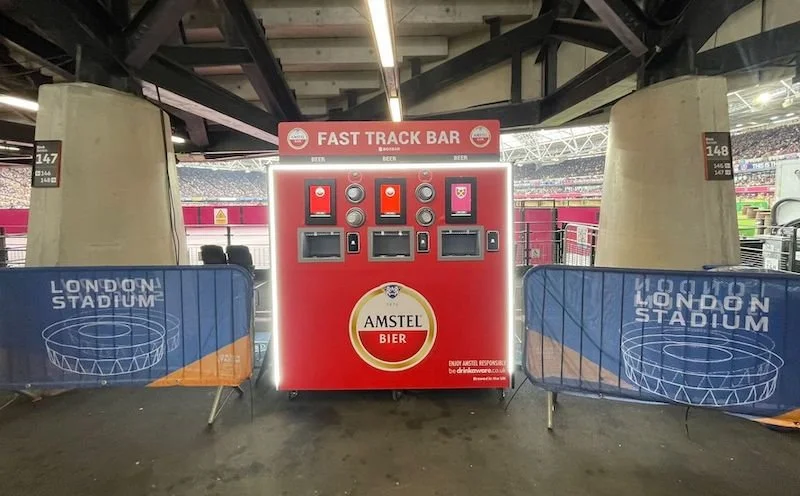Betting goes high-tech: key technological developments driving the sports betting industry
The sports betting industry has recently witnessed a revolutionary transformation thanks to groundbreaking technological advancements.
Gone are the days when bettors had to visit bricks and mortar betting shops or rely on phone calls to place their wagers. Today, technology has ushered in a new era of convenience, accessibility, and engagement in sports betting.
Mobile betting and apps
The rise of mobile technology has profoundly impacted the sports betting industry, with mobile betting apps becoming game-changers for bettors and bookmakers. These user-friendly apps have made it incredibly convenient for bettors to place their bets anytime and anywhere.
Real-time odds, live streaming, and instant notifications keep users updated with the latest developments in their favorite sports, ensuring that they never miss out on betting opportunities. The convenience and accessibility offered by mobile betting apps have attracted a new generation of bettors, leading to exponential growth in the mobile betting market.
Moreover, these apps have opened up new avenues for in-play betting, allowing users to wager on in-in events as they unfold in real time. This real-time interaction with ongoing games provides an exhilarating and immersive experience, increasing the thrill of sports betting.
Additionally, mobile apps facilitate seamless payment options, ensuring secure and hassle free transactions, which is crucial in building trust and retaining users.
Artificial intelligence (AI) and machine learning
Artificial Intelligence (AI) and Machine Learning have revolutionised the sports betting landscape by providing valuable insights and enhancing the overall betting experience.
AI algorithms can analyze vast amounts of data, including player statistics, team performance, and historical match data, to generate accurate predictions.
Bookmakers and betting platforms employ AI-powered risk management systems to assess odds and minimise potential losses.
Furthermore, AI enables personalised recommendations and betting tips based on individual betting behaviour, fostering deeper user engagement and retention. AI powered chatbots have also provided customer support, efficiently addressing queries and resolving issues promptly.
In addition to improving user experiences, AI has become a powerful tool for bookmakers to optimise their operations. AI driven pricing models help bookmakers set odds more accurately, ensuring a fair and profitable betting market.
Big Data analytics
The sports betting industry has experienced a significant transformation with the advent of Big Data analytics. The sheer amount of data generated during sporting events might seem overwhelming, but bookmakers have harnessed the power of advanced analytics tools to gain valuable insights.
Thanks to big data analytics, comprehensive databases have been created, meticulously tracking player and team performance over time. This wealth of information, combined with an enticing deposit match bonus offer, empowers bettors to make well-informed decisions based on historical trends, head-to-head records, and other critical factors that can greatly influence the outcome of a game.
Access to such extensive data has given sports betting enthusiasts a tremendous advantage in developing their betting strategies and placing more calculated wagers. The integration of Big Data analytics has truly leveled the playing field, allowing bettors to compete with heightened knowledge and a deeper understanding of the sports they are passionate about.
By embracing the data-driven approach, the sports betting industry has reached new heights, providing an enriching experience for bookmakers and bettors. With the continuous evolution of technology and analytics, the future of sports betting promises even more exciting opportunities and possibilities for enthusiasts to engage with their favourite sports on a whole new level.
Blockchain technology
Blockchain technology has emerged as a disruptive force in the sports betting industry, introducing new transparency, security, and decentralization levels. Blockchain-based betting platforms offer tamper-proof, publicly verifiable transaction records, ensuring fair play and trust between bettors and operators.
Smart contracts enable automatic and transparent payouts, eliminating the need for intermediaries and reducing transaction costs. Moreover, the immutable nature of blockchain ensures that historical data cannot be altered, adding an extra layer of security and reliability to the betting process.
Additionally, blockchain-based platforms provide users with enhanced privacy and anonymity, appealing to bettors who value their data security.
Live streaming
Live streaming capabilities directly on sports betting platforms have been a game-changer in the industry, elevating the entire betting experience to new heights of immersion and interaction. This innovative technology allows bettors to witness sports events unfold in real-time and place bets concurrently, thus intensifying the thrill of the game.
The immediate access to both viewing and betting creates a dynamic and exciting environment, and it also enables more informed decisions, as bets can be based on the real-time performance of teams and players. Thus, livestreaming has transformed sports betting into a more engaging and interactive experience.
Virtual and augmented reality
Virtual Reality (VR) and Augmented Reality (AR) have transformed the sports betting experience by providing bettors with a more immersive and engaging platform.
VR technology allows users to virtually experience stadiums and live matches, making them feel as though they are physically present at the event. This immersive experience enhances the excitement of in-play betting, enabling users to respond to match dynamics in real-time.
Conversely, AR enriches the betting experience by overlaying virtual elements in the real world. AR can provide real-time statistics and graphics during live matches, allowing bettors to access crucial information instantly. The combination of VR and AR has elevated the betting experience, making it more interactive and enjoyable for users.
Moreover, VR and AR technologies have opened up new opportunities for sportsbooks to create unique and innovative marketing campaigns. By offering VR experiences or AR enhanced content, sports betting platforms can better engage with their audience and attract new users.
For example, a VR experience that simulates the atmosphere of a major sporting event can entice potential bettors to engage with the platform and explore its offerings further.
Cash out feature
The cash-out feature has been a game-changer for sports bettors, providing them with increased control over their bets. With this feature, users can settle their bets before the conclusion of an event, either to secure partial profits or minimize potential losses.
Real-time odds fluctuations determine the cash-out value, empowering bettors to adapt their strategies based on the unfolding match dynamics. This feature adds extra excitement to the betting experience, as bettors can now actively manage their wagers in response to critical moments during a game.
The cash-out feature has also proven to be a valuable risk management tool for bettors. This feature is handy for in-play betting, where odds fluctuate rapidly, and game dynamics change unexpectedly. Bettors can make real-time decisions to safeguard their investments or capitalize on favorable outcomes.
Summary
Technological developments have propelled the sports betting industry into a new era, offering bettors unprecedented convenience, insights, and control over their betting experiences. Integrating mobile betting apps has transformed how people place their bets, making it easier and more accessible than ever.
















Continue reading…